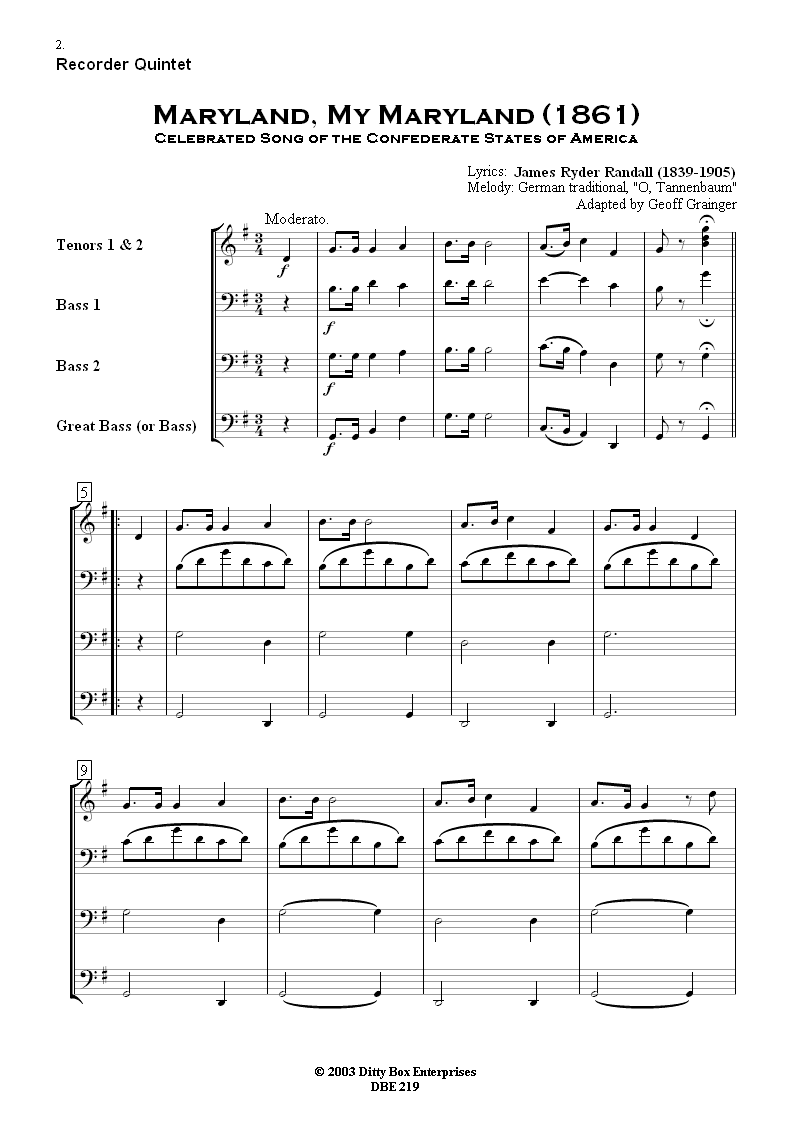Maryland, My Maryland (1861)
Celebrated Song of the Confederate States of America
Celebrated Song of the Confederate States of America
Last updated: 28.01.22

| Composer: | J.R. Randall | Suppliers: |  |
| Editor: | Geoff Grainger | Quintet | T/T/B/B/GB(B)/V(OT) |
| Publisher: | Ditty Box Enterprises | Publication: | DBE 219 |
| Add to cart: |  |
This recorder adaptation of Maryland, my Maryland is based on an undated 19th century item of piano sheep music entitled Celebrated Songs of the Confederate States of America. No. 1. My Maryland which was published by Hopwood & Crew of New Bond Street, London. It was dedicated to the Confederate Exiles in Europe, no credits being given either to the poet or to the melody's origins. The melody itself enjoys an immense international popularity. As an advent song O, Tannenbaum it is an immortal evergreen [pun intended!] in Germany and throughout the Christmas song-singing world. As a Jazz standard, Maryland, my Maryland is basic repertoire It finds its place in my own beloved, not-so-shy Royal Navy used in the ditty On Gibraltar' Slopes. In the guise of the Red Flag it is similarly abused in Rugby songs and no end of parodies. The Red Flag, which was and still is of course the hymn of the British Labour Party, was written by Jim Connell (1862-1929), an Irish trade union activist, and sung at their annual conferences. Although originally used with the melody White Cockade, the O, Tannenbaum version has taken preference and as such since then has achieved universal fame in the international labour movement. When considering the foregoing, the editor of this recorder adaptation has not the slightest of qualms in adding yet another version to a very long line of predecessors - it is long overdue!
Performance notes: If the 1st bass cannot play the high notes (bars 5-12, 17 & 18) then playing an octave below can be used to good effect. Alternatively a 3 rd tenor could be used with minor modification of the melody.
Length: approx. 9 ½ mins., when all 9 verses are sung otherwise 2 ½ mins. when as pure instrumental repeated twice. A tempo of 90 crotchets/min. is suggested.
This recorder adaptation is respectfully dedicated to Lynne Priest Fitzpatrick, recorder player and musician of Annapolis, Maryland.
| Instruments | Performer |
|---|
| DBE MP3 Sample | ||
 |
T/T/B/B/GB(B)/V(OT) | Midi Ragtime Recorder Ens. |
| Performer | CD Title | Supplier |
|---|
 |
New Orleans Ragtime Orchestra | Creole Belles | CD(s) & MP3 Album(s)       
|

